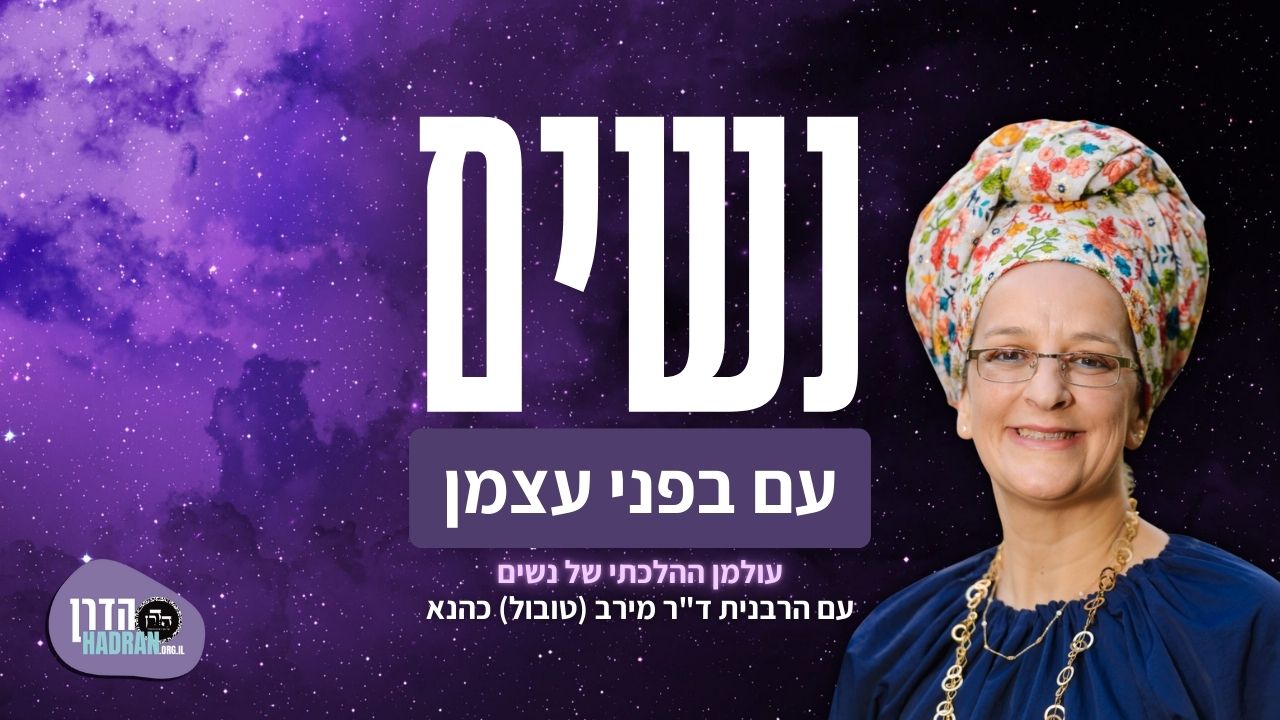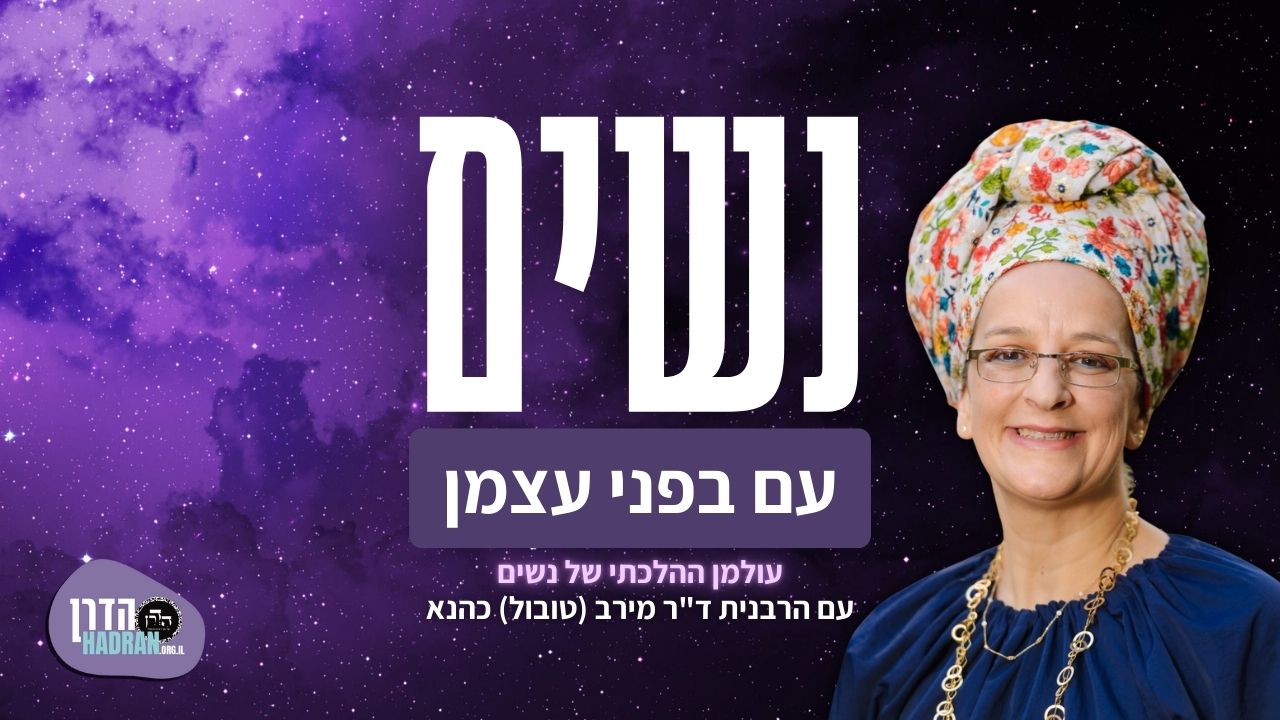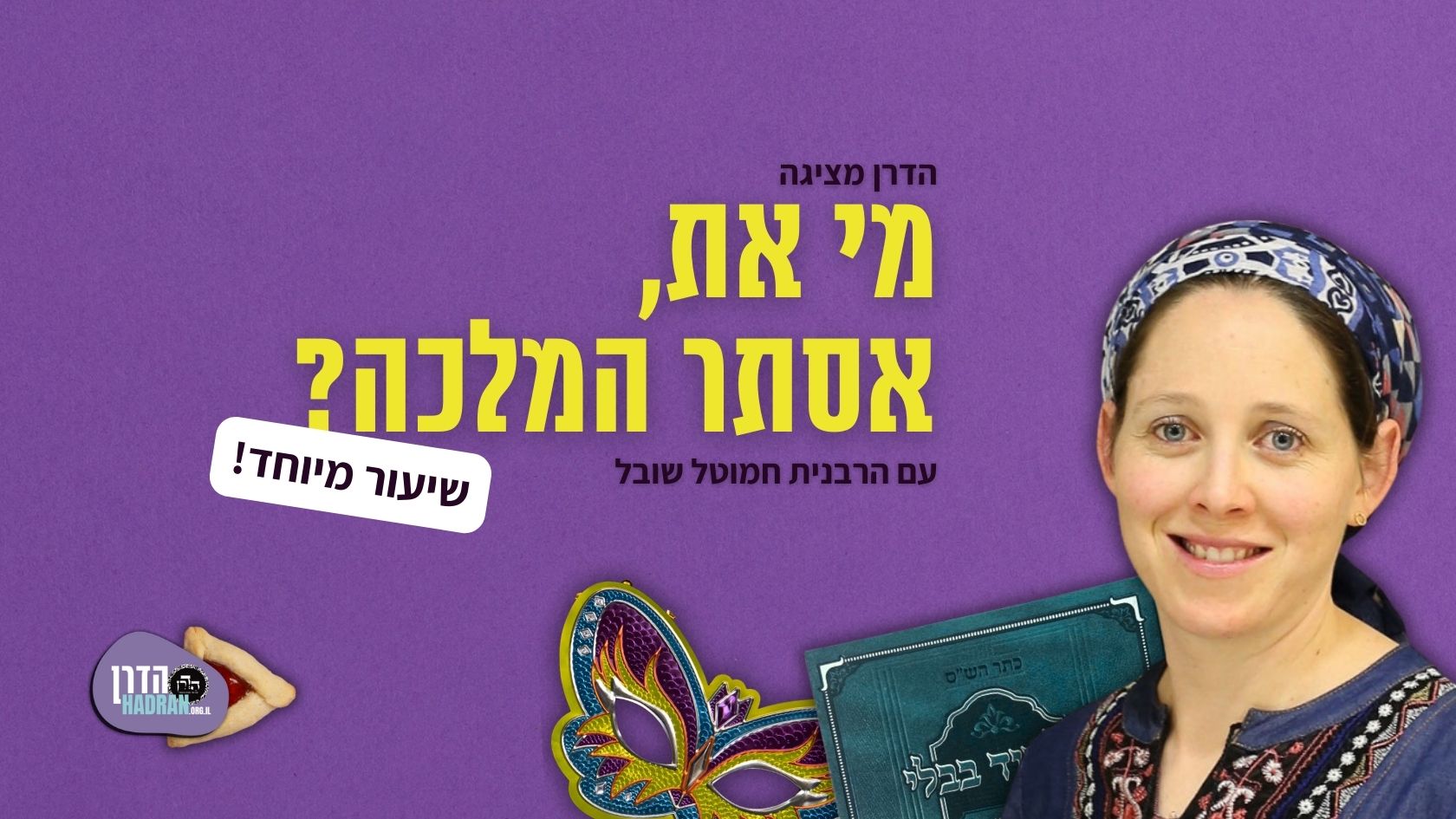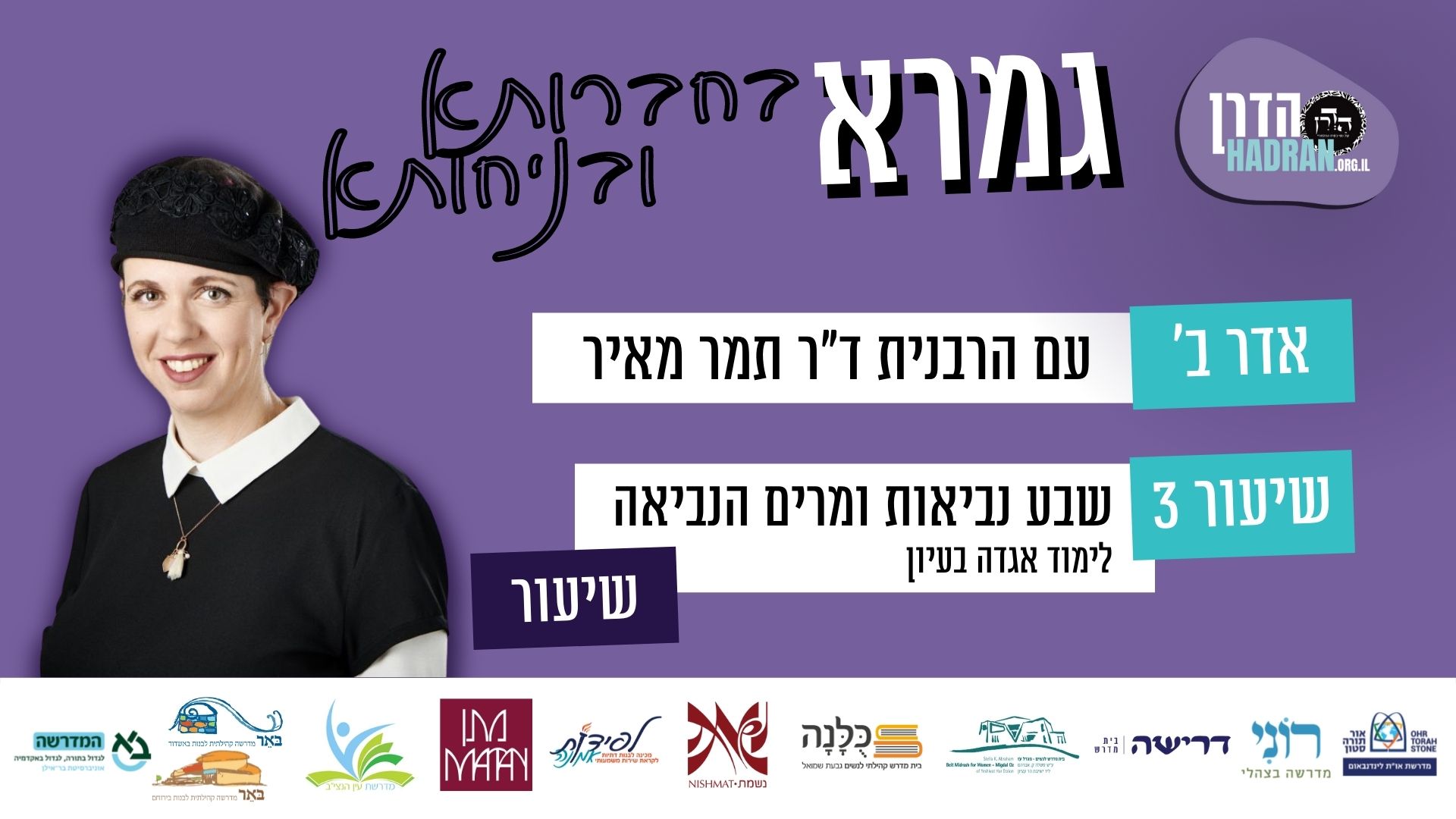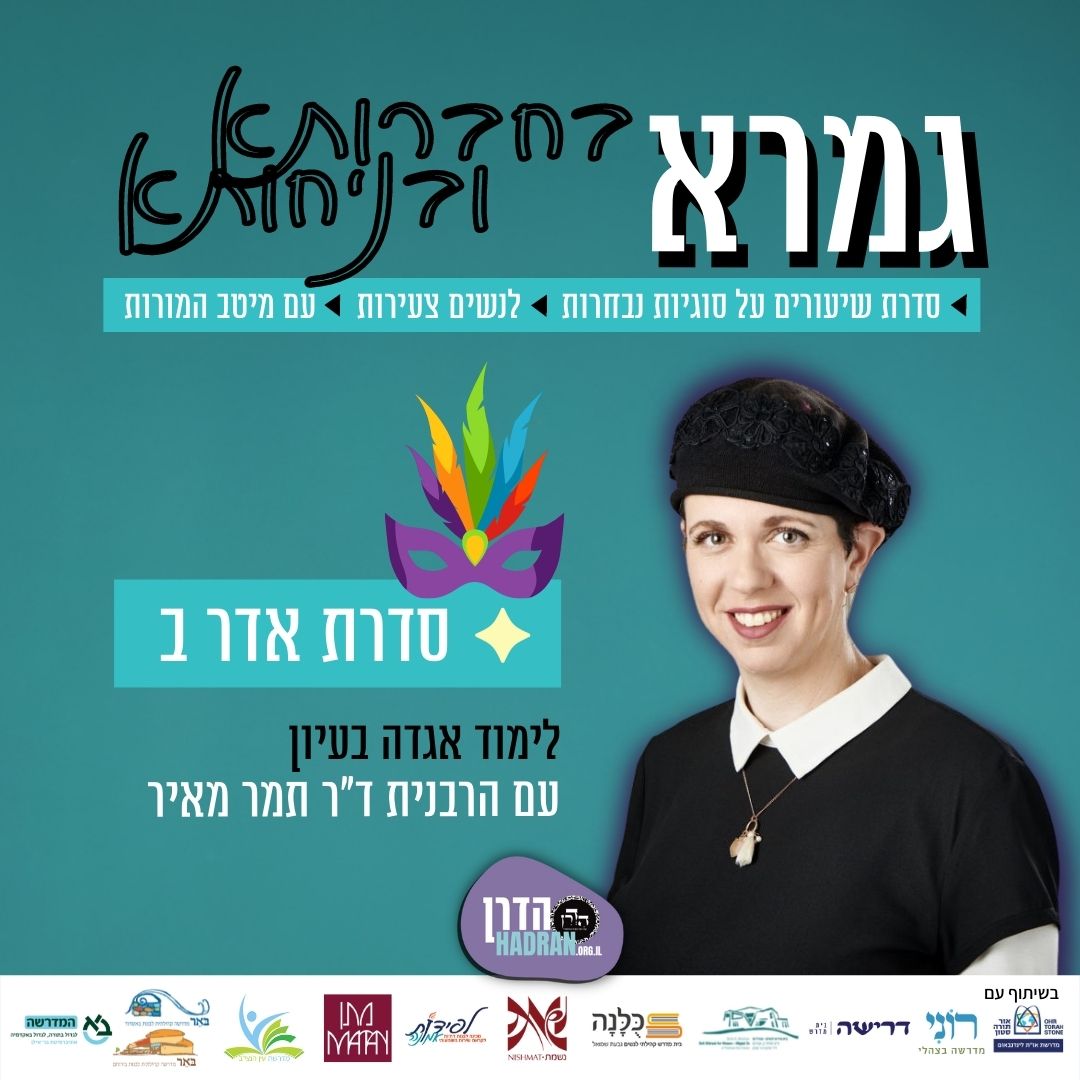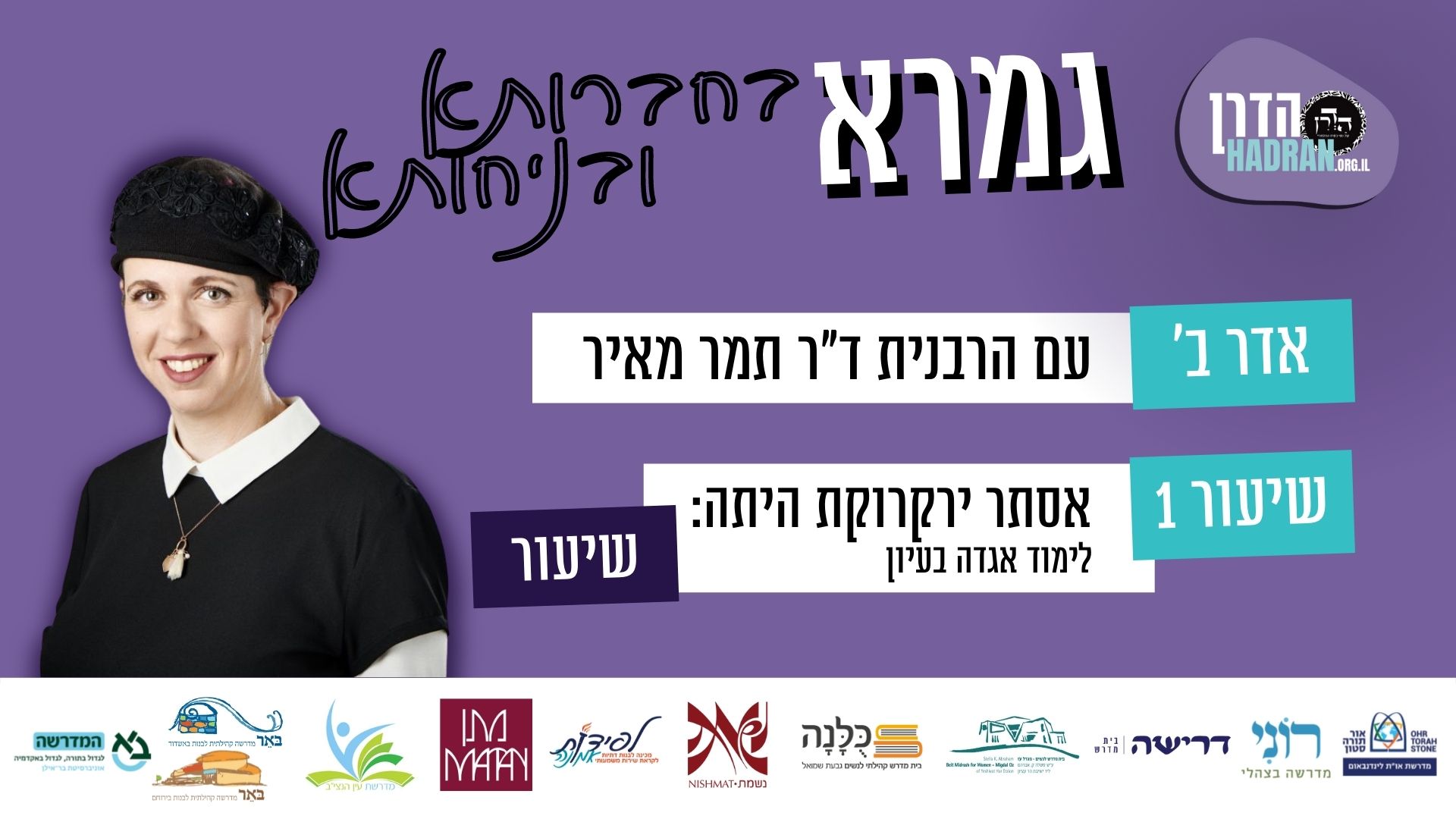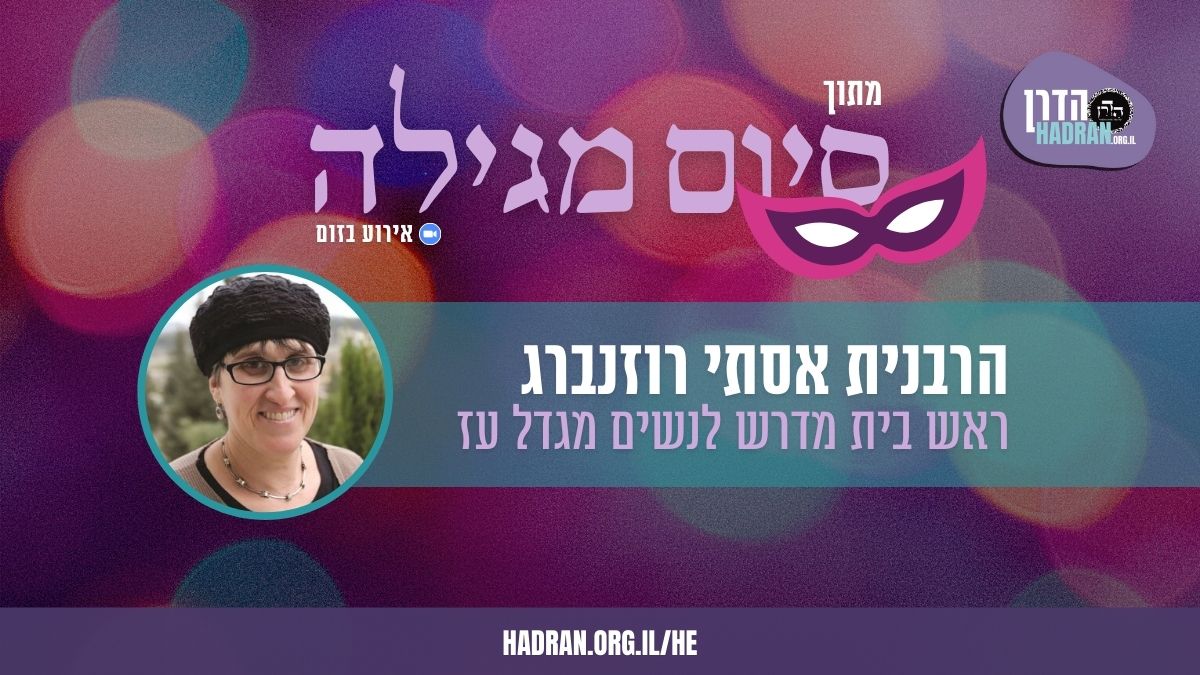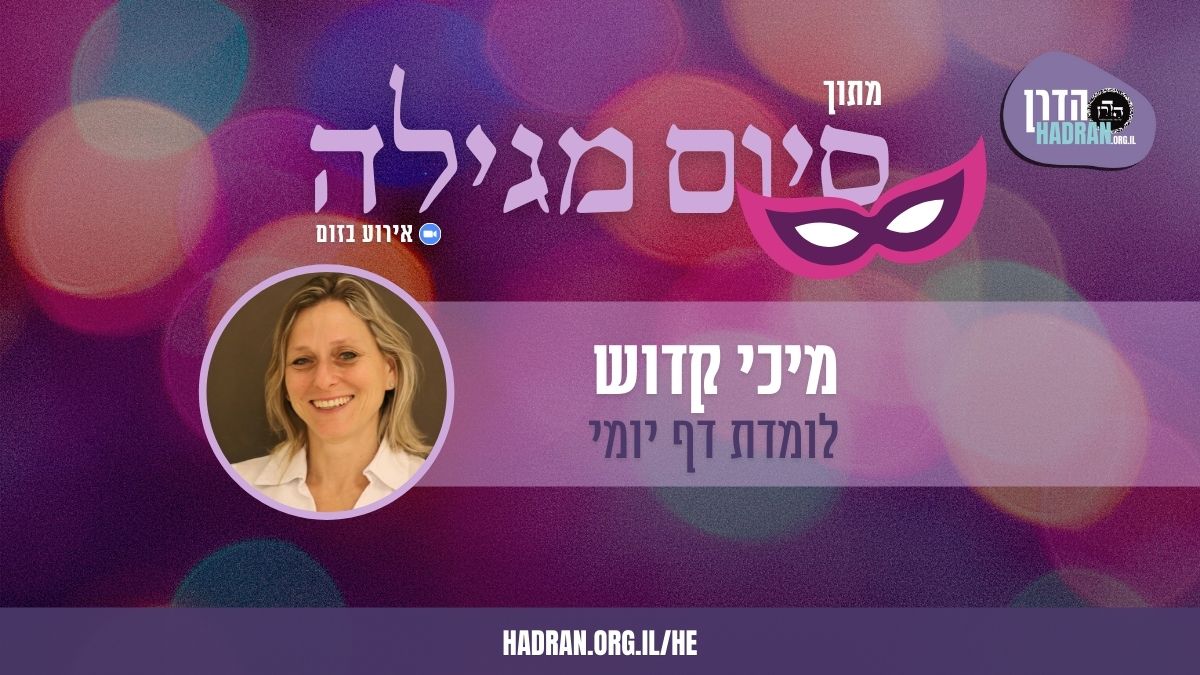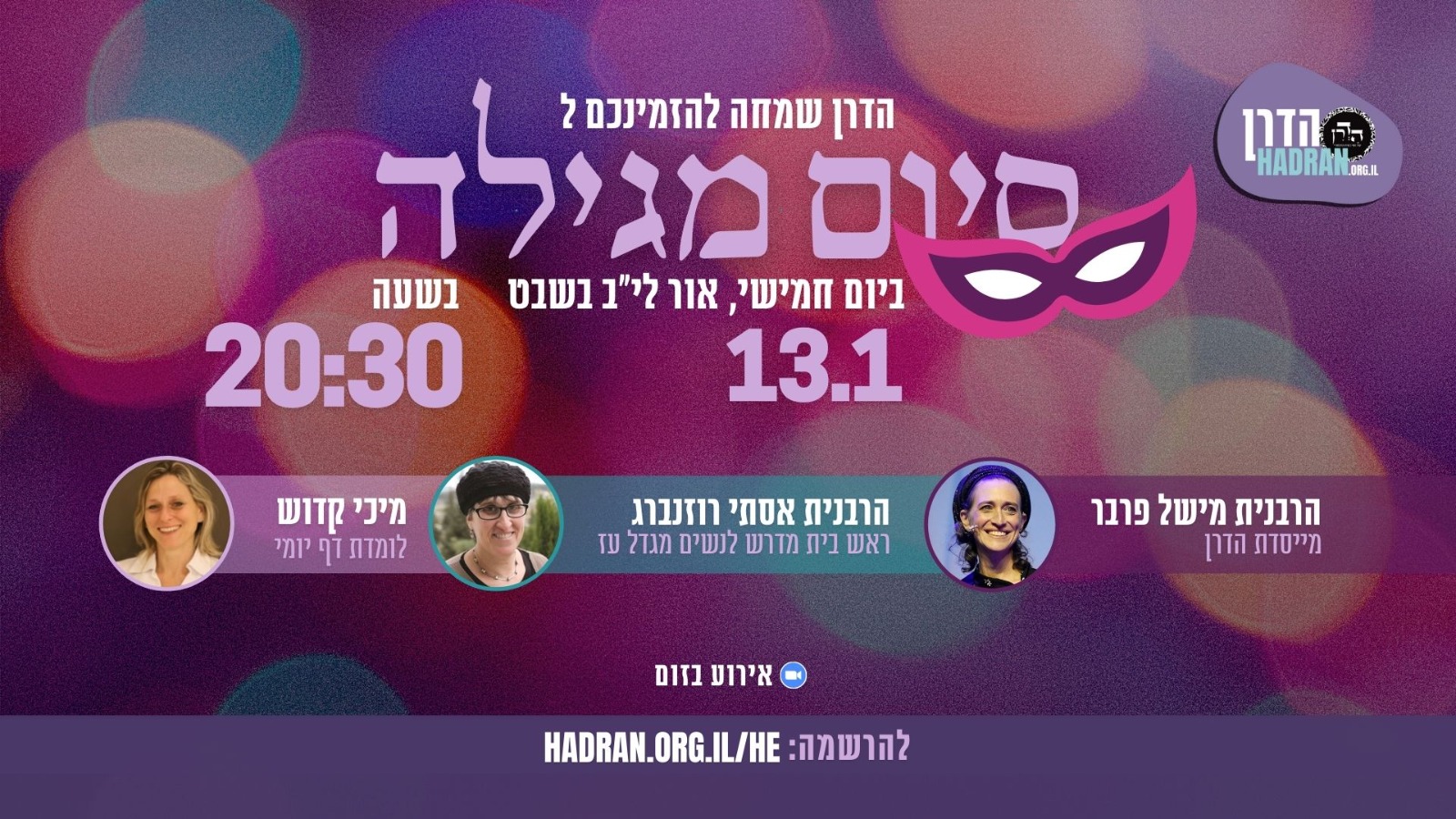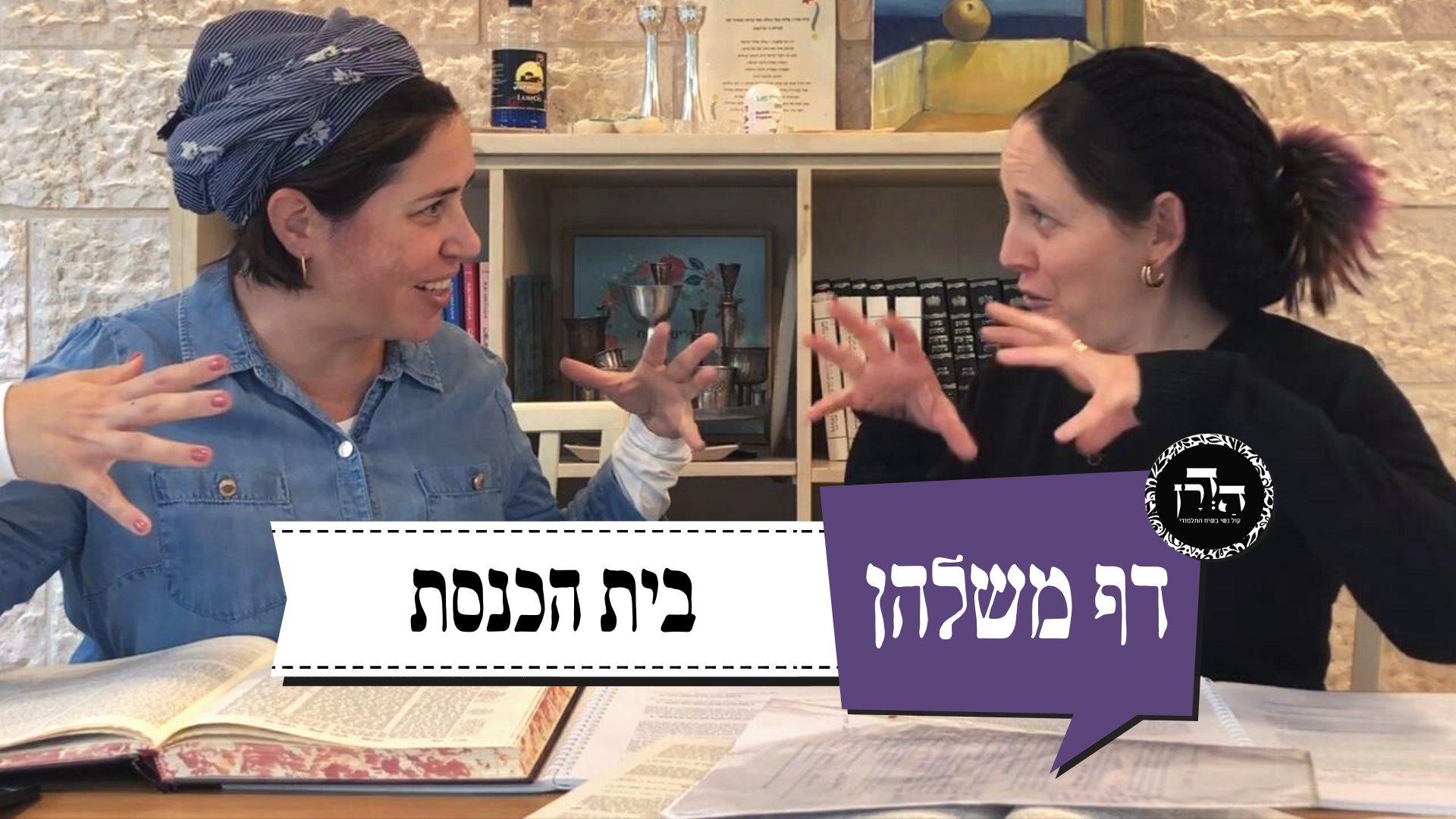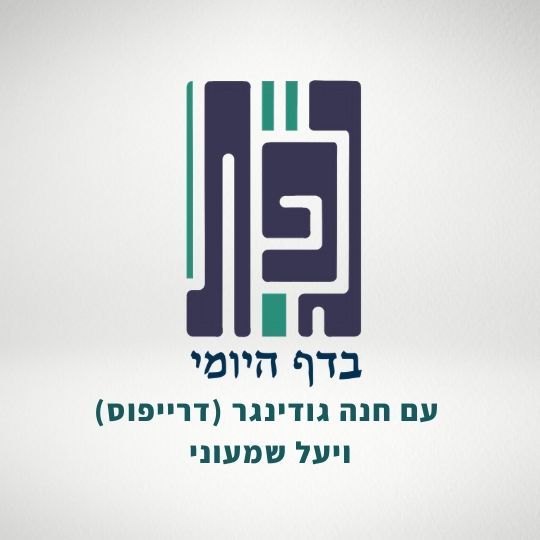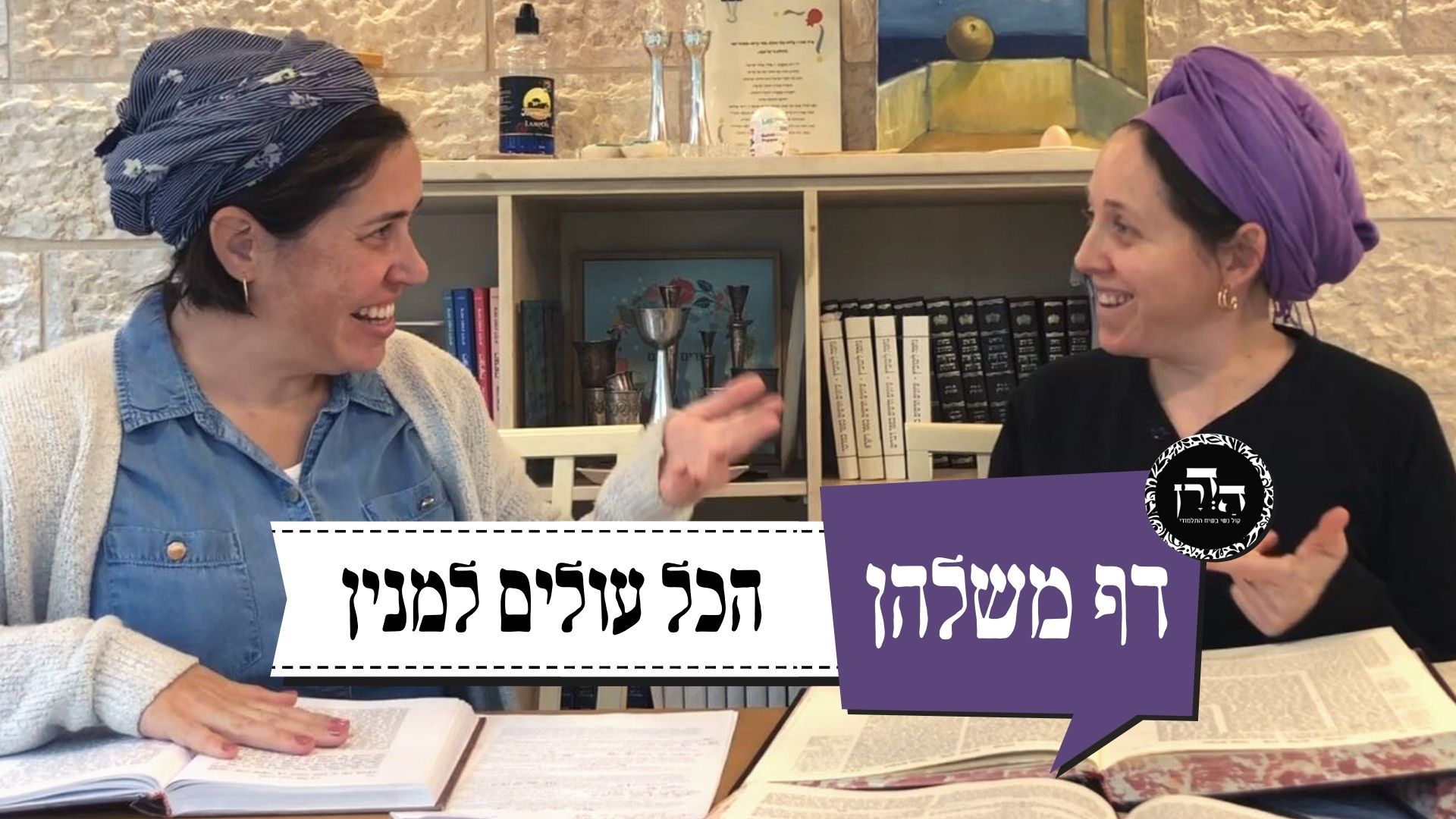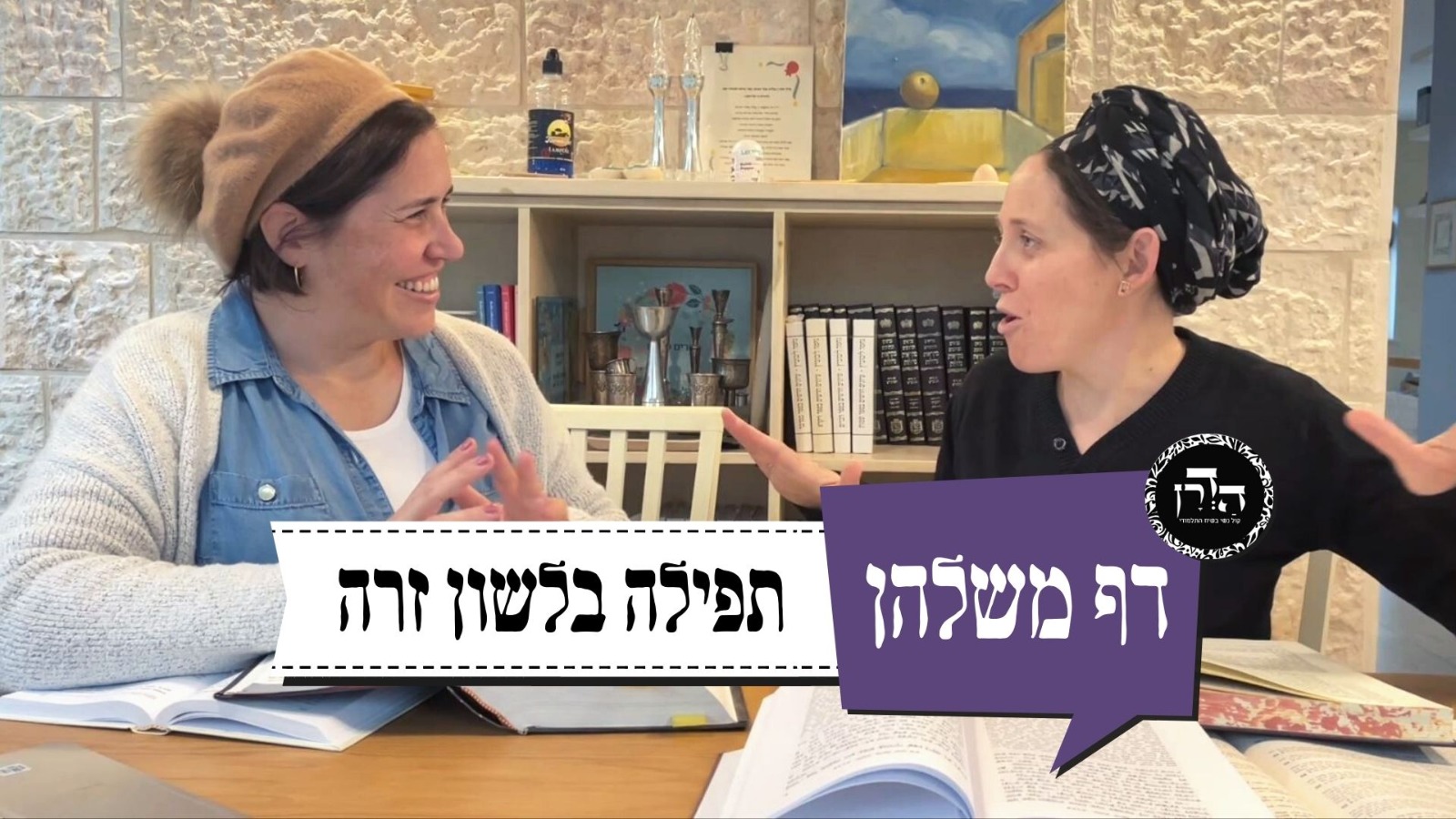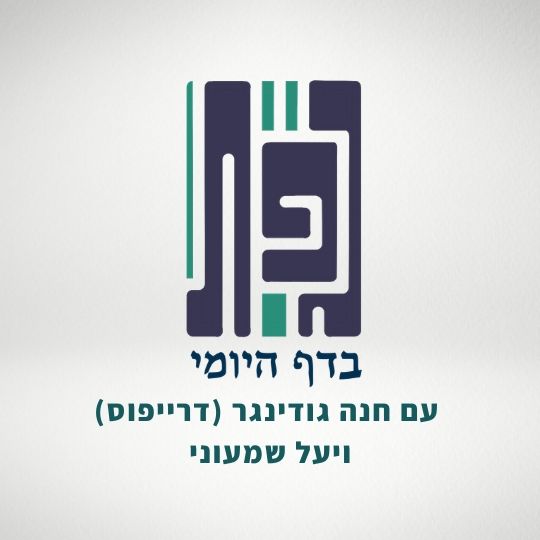מהם חומרים שונים שלא ניתן להשתמש בהם לכתיבת מגילה? מאיפה נלמד שזה צריך להיות כתוב עם דיו ועל קלף? אם מתגוררים בעיר שאינה מוקפת חומה או בעיר מוקפת חומה ומבקרים בעיר מסוג אחר בפורים, איזה יום של פורים יש לחגוג? מאיזה פסוק במגילה מתחילים לקרוא? מובאות כמה דעות – מההתחלה, מהופעתו ראשונה של מרדכי, מהופעתו הראשונה של המן, מהלילה שנדדה שנתו של אחשורוש. מה שורש הוויכוח בין הרבנים השונים? מהי משמעותה של זה שהמגילה שנקראת גם ספר וגם אגרת? צריך לקרוא מגילה מקלף שרק מכיל את המגילה ואינו כולל ספרי כתבים אחרים. אילו הגבלות יש לדין זה? מי כשר ומי לא כשר לקרוא את המגילה? כשהמשנה אומרת שאדם חרש אינו יכול לקרוא את המגילה, האם דעתו כרבי יוסי הסובר שרק מי שמשמיע לאזנו יצא? או כדעת רבי יהודה שאינו מחייב להשמיע לאזנו אבל לכתחילה עדיף שכן? האם זו באמת דעתו של רבי יהודה? אם כן, יש בעיה עם ברייתא לגבי חרש שמברך על תרומה מלכתחילה שאין הברייתא תואמת אף דעה – לא ר’ יוסי ולא ר’ יהודה.
רוצה להקדיש שיעור?
כלים
העמקה
רוצה להבין מה באמת קורה מתחת לפני השטח של הסוגיה?
שיעורים, פודקאסטים והרחבות של מיטב המורות שלנו יפתחו לך עוד זוויות וכיווני חשיבה.
חדשה בלימוד הגמרא?
זה הדף הראשון שלך? איזו התרגשות עצומה! יש לנו בדיוק את התכנים והכלים שיעזרו לך לעשות את הצעדים הראשונים ללמידה בקצב וברמה שלך, כך תוכלי להרגיש בנוח גם בתוך הסוגיות המורכבות ומאתגרות.
פסיפס הלומדות שלנו
גלי את קהילת הלומדות שלנו, מגוון נשים, רקעים וסיפורים. כולן חלק מתנועה ומסע מרגש ועוצמתי.
מגילה יט
קַנְקַנְתּוֹם — חַרְתָּא דְאוּשְׁכָּפֵי. דִּיפְתְּרָא — דִּמְלִיחַ וּקְמִיחַ וְלָא עֲפִיץ. נְיָיר — מְחָקָא.
Kankantom is what is called in Aramaic ḥarta de’ushkafei, a black dye used by shoemakers. Diftera is hide that was processed with salt and flour, but not with gallnuts. Neyar is known in Aramaic as maḥaka, paper made from reeds.
עַד שֶׁתְּהֵא כְּתוּבָה אַשּׁוּרִית, דִּכְתִיב: ״כִּכְתָבָם וְכִזְמַנָּם״.
§ It was taught in the mishna: He does not fulfill his obligation unless the Megilla is written in Ashurit. The Gemara explains the reason for this: As it is written concerning the Megilla: “According to their writing and according to their time” (Esther 9:27), i.e., the way it was originally written.
״עַל הַסֵּפֶר וּבִדְיוֹ וְכוּ׳״. מְנָלַן? אַתְיָא ״כְּתִיבָה״ ״כְּתִיבָה״. כְּתִיב הָכָא: ״וַתִּכְתֹּב אֶסְתֵּר הַמַּלְכָּה״, וּכְתִיב הָתָם: ״וַיֹּאמֶר לָהֶם בָּרוּךְ מִפִּיו יִקְרָא אֵלַי אֵת כׇּל הַדְּבָרִים הָאֵלֶּה וַאֲנִי כּוֹתֵב עַל הַסֵּפֶר בַּדְּיוֹ״.
The mishna concludes: He does not fulfill his obligation unless the Megilla is written “upon parchment and with ink.” The Gemara asks: From where do we derive this? The Gemara answers: It is derived by way of a verbal analogy between one instance of writing and another instance of writing. It is written here in the book of Esther: “Then Esther the queen, the daughter of Abihail, and Mordecai the Jew, wrote all the acts of power, to confirm this second letter of Purim” (Esther 9:29), and it is written there: “Then Baruch answered them: He pronounced all these words to me with his mouth, and I wrote them with ink on the parchment” (Jeremiah 36:18). Just as there the writing was with ink on parchment, so too here, a Megilla must be written with ink on parchment.
מַתְנִי׳ בֶּן עִיר שֶׁהָלַךְ לִכְרַךְ וּבֶן כְּרַךְ שֶׁהָלַךְ לְעִיר, אִם עָתִיד לַחְזוֹר לִמְקוֹמוֹ — קוֹרֵא כִּמְקוֹמוֹ, וְאִם לָאו — קוֹרֵא עִמָּהֶן.
MISHNA: With regard to a resident of an unwalled town who went to a walled city, where the Megilla is read on the fifteenth of Adar, and conversely, a resident of a walled city who went to an unwalled town where it is read on the fourteenth, the following distinction applies: If he is destined to return to his original place, he reads it according to the halakha governing his own place, and if not, i.e., if he is not destined to return to his place, he reads with them, the residents of his current location.
וּמֵהֵיכָן קוֹרֵא אָדָם אֶת הַמְּגִילָּה וְיוֹצֵא בָּהּ יְדֵי חוֹבָה? רַבִּי מֵאִיר אוֹמֵר: כּוּלָּהּ. רַבִּי יְהוּדָה אוֹמֵר: מֵ״אִישׁ יְהוּדִי״. רַבִּי יוֹסֵי אוֹמֵר: מֵ״אַחַר הַדְּבָרִים הָאֵלֶּה״.
Beginning from where must a person read the Megilla in order to fulfill his obligation? Rabbi Meir says: He must read all of it. Rabbi Yehuda says: He need read only from “There was a certain Jew” (Esther 2:5). Rabbi Yosei says: From “After these things” (Esther 3:1).
גְּמָ׳ אָמַר רָבָא: לֹא שָׁנוּ אֶלָּא שֶׁעָתִיד לַחְזוֹר בְּלֵילֵי אַרְבָּעָה עָשָׂר, אֲבָל אֵין עָתִיד לַחְזוֹר בְּלֵילֵי אַרְבָּעָה עָשָׂר — קוֹרֵא עִמָּהֶן. אָמַר רָבָא: מְנָא אָמֵינָא לַהּ? דִּכְתִיב: ״עַל כֵּן הַיְּהוּדִים הַפְּרָזִים הַיּוֹשְׁבִים בְּעָרֵי הַפְּרָזוֹת״. מִכְּדֵי כְּתִיב: ״הַיְּהוּדִים הַפְּרָזִים״, לְמָה לִי לְמִיכְתַּב ״הַיּוֹשְׁבִים בְּעָרֵי הַפְּרָזוֹת״? הָא קָא מַשְׁמַע לַן, דְּפָרוּז בֶּן יוֹמוֹ נִקְרָא פָּרוּז.
GEMARA: Rava said: They taught the mishna that one who is destined to return to his own place reads according to the halakha governing his own place only with regard to one who is destined to return to his own place on the night of the fourteenth of Adar. But if he is not destined to return on the night of the fourteenth, although he does intend to return to his own place eventually, he reads with the residents of his current location. Rava said: From where do I say this? As it is written: “Therefore the Jews of unwalled towns, who dwell in the unwalled towns, make the fourteenth day of the month Adar a day of gladness and feasting” (Esther 9:19). Since it is already written: “The Jews of unwalled towns,” why do I need it to write further, “who dwell in the unwalled towns”? It comes to teach us this: That one who is in an unwalled town even for the day is also called one who lives in an unwalled town.
אַשְׁכְּחַן פָּרוּז, מוּקָּף מְנָא לַן? סְבָרָא הוּא: מִדְּפָרוּז בֶּן יוֹמוֹ קָרוּי פָּרוּז, מוּקָּף בֶּן יוֹמוֹ קָרוּי מוּקָּף.
The Gemara asks: We have found proof for a resident of a walled city who is temporarily located in an unwalled town. But from where do we derive the opposite case, that one from an unwalled town who is temporarily in a walled city is governed by a similar halakha? The Gemara answers: It is based on logical reasoning: Since one who is in an unwalled town for the day is called someone from an unwalled town, so too conversely, one who is in a walled city for a day is called someone from a walled city.
וְאָמַר רָבָא: בֶּן כְּפָר שֶׁהָלַךְ לְעִיר — בֵּין כָּךְ וּבֵין כָּךְ קוֹרֵא עִמָּהֶן. מַאי טַעְמָא? הַאי כִּבְנֵי הָעִיר בָּעֵי לְמִקְרֵי, וְרַבָּנַן הוּא דַּאֲקִילּוּ עַל הַכְּפָרִים כְּדֵי שֶׁיְּסַפְּקוּ מַיִם וּמָזוֹן לַאֲחֵיהֶם שֶׁבַּכְּרַכִּין. הָנֵי מִילֵּי — כִּי אִיתֵיהּ בְּדוּכְתֵּיהּ, אֲבָל כִּי אִיתֵיהּ בְּעִיר — כִּבְנֵי עִיר בָּעֵי לְמִקְרֵי.
And Rava said further: Someone from a village, where the Megilla is read on the Monday or Thursday prior to Purim (2a), who went to a town, reads the Megilla with the residents of the town, even if he had already read it in his own place. He does so in all circumstances, whether or not he will be returning to his own village. The Gemara explains: What is the reason for this ruling? This villager should actually have read at the same time as the residents of the towns, but the Sages showed leniency toward the people of the villages and allowed them to advance their reading of the Megilla to the previous day of assembly so that they would be free to supply water and food to their brethren in the cities on the day of Purim. This, however, applies only when the villager is in his place, in the village, but when he is in a town, he is required to read like the residents of the town, and not like the villagers.
אֵיתִיבֵיהּ אַבָּיֵי: בֶּן כְּרַךְ שֶׁהָלַךְ לְעִיר — בֵּין כָּךְ וּבֵין כָּךְ קוֹרֵא כִּמְקוֹמוֹ. בֶּן כְּרַךְ סָלְקָא דַּעְתָּךְ?! בְּאִם עָתִיד לַחְזוֹר תַּלְיָא מִילְּתָא, אֶלָּא לָאו, בֶּן כְּפָר.
Abaye raised an objection to Rava from a baraita: A resident of a walled city who went to an unwalled town, in all circumstances, whether or not he will be returning to his own city, reads the Megilla according to the halakha governing his permanent place. The Gemara first questions the text of the baraita as it is currently worded: Can it enter your mind that the resident of a walled city always reads in accordance with the halakha governing his own place, even if he is currently situated in an unwalled town? But doesn’t the matter depend on whether or not he will be returning on Purim to his hometown, as stated in the mishna? Therefore, it is clear that the baraita must be emended. Rather, is it not to be changed to: A resident of a village who went to an unwalled town? The baraita therefore teaches that a resident of a village who is visiting in a town must read the Megilla according to the halakha governing his own place, the village, unlike Rava’s teaching.
וְלָאו תָּרוֹצֵי מְתָרְצַתְּ? תְּנִי: קוֹרֵא עִמָּהֶן.
The Gemara rejects this: But did you not emend the reading in the baraita? Since you admit that the baraita in any event requires revision, change it further and teach: He reads the Megilla with the residents of the town. This wording in the baraita would then support the opinion of Rava.
מֵהֵיכָן קוֹרֵא אָדָם אֶת הַמְּגִילָּה וְכוּ׳. תַּנְיָא, רַבִּי שִׁמְעוֹן בֶּן יוֹחַאי אוֹמֵר: מִ״בַּלַּיְלָה הַהוּא״.
§ The mishna teaches that three Sages disagree about the question: Beginning from where must a person read the Megilla in order to fulfill his obligation? It is taught in a baraita that there is a fourth opinion as well: Rabbi Shimon bar Yoḥai says: One must start to read from “On that night” (Esther 6:1).
אָמַר רַבִּי יוֹחָנָן, וְכוּלָּן מִקְרָא אֶחָד דָּרְשׁוּ: ״וַתִּכְתֹּב אֶסְתֵּר הַמַּלְכָּה וּמׇרְדֳּכַי הַיְּהוּדִי אֶת כׇּל תּוֹקֶף״, מַאן דְּאָמַר כּוּלָּהּ — תּוֹקְפּוֹ שֶׁל אֲחַשְׁוֵרוֹשׁ.
Rabbi Yoḥanan said: And all of these tanna’im, in arriving at their respective opinions, were expounding the same verse. As it is stated: “Then Esther the queen, the daughter of Abihail, and Mordecai the Jew, wrote about all the acts of power to confirm this second letter of Purim” (Esther 9:29). The one who said that the Megilla must be read in its entirety interprets “acts of power” as referring to the power of Ahasuerus, and so the Megilla must be read from the beginning, where the power of Ahasuerus is recounted.
וּמַאן דְּאָמַר מֵ״אִישׁ יְהוּדִי״ — תּוֹקְפּוֹ שֶׁל מָרְדֳּכַי, וּמַאן דְּאָמַר מֵ״אַחַר הַדְּבָרִים הָאֵלֶּה״ — תּוֹקְפּוֹ שֶׁל הָמָן, וּמַאן דְּאָמַר מִ״בַּלַּיְלָה הַהוּא״ — תּוֹקְפּוֹ שֶׁל נֵס.
And the one who said that it needs to be read from “There was a certain Jew” explains that “acts of power” is referring to the power of Mordecai. And the one who said that it needs to be read from “After these things” maintains that “acts of power” is referring to the power of Haman. And the one who said that it needs to be read from “On that night” understands that the expression is referring to the power of the miracle, which began on that night when Ahasuerus could not sleep, and therefore one must begin reading the Megilla from there.
רַב הוּנָא אָמַר, מֵהָכָא: ״וּמָה רָאוּ עַל כָּכָה וּמָה הִגִּיעַ אֲלֵיהֶם״,
Rav Huna said: The four Sages derived their respective opinions from here: “Therefore, because of all the words of this letter, and of that which they saw concerning this matter, and that which had befallen them, the Jews ordained…that they would keep these two days” (Esther 9:26–27).
מַאן דְּאָמַר כּוּלָּהּ: ״מָה רָאָה״ — אֲחַשְׁוֵרוֹשׁ שֶׁנִּשְׁתַּמֵּשׁ בְּכֵלִים שֶׁל בֵּית הַמִּקְדָּשׁ, ״עַל כָּכָה״ — מִשּׁוּם דְּחַשֵּׁיב שִׁבְעִים שְׁנִין וְלָא אִיפְּרוּק, ״וּמָה הִגִּיעַ אֲלֵיהֶם״ — דִּקְטַל וַשְׁתִּי.
Rav Huna continued: The one who said that the Megilla must be read in its entirety explains the verse as follows: “They saw” refers to what Ahasuerus saw, in that he used the vessels of the Temple. “Concerning this matter” was because he had calculated seventy years from the Babylonian exile and the Jews were still not redeemed, and he consequently thought that they would never enjoy deliverance. “And that which had befallen them” is referring to the fact that he had killed Vashti. Since the Megilla was written and continues to be read in order to inform future generations of all these events and what had happened to the people who were involved, and these are detailed at the beginning of the Megilla, it must be read in its entirety.
וּמַאן דְּאָמַר מֵ״אִישׁ יְהוּדִי״: ״מָה רָאָה״ — מָרְדְּכַי דְּאִיקַּנִּי בְּהָמָן, ״עַל כָּכָה״ — דְּשַׁוִּי נַפְשֵׁיהּ עֲבוֹדָה זָרָה, ״וּמָה הִגִּיעַ אֲלֵיהֶם״ — דְּאִתְרְחִישׁ נִיסָּא.
And the one who said that the Megilla needs to be read from “There was a certain Jew” interprets this verse as follows: That which Mordecai “saw” in that he acted so zealously concerning Haman. “Concerning this matter” was because Haman had made himself an object of idol worship. “And that which had befallen them” is referring to the fact that a miracle took place. Therefore one must read the Megilla from “There was a certain man,” where all this is recounted.
וּמַאן דְּאָמַר מֵ״אַחַר הַדְּבָרִים הָאֵלֶּה״: ״מָה רָאָה״ — הָמָן שֶׁנִּתְקַנֵּא בְּכׇל הַיְּהוּדִים, ״עַל כָּכָה״ — מִשּׁוּם דְּמָרְדְּכַי ״לֹא יִכְרַע וְלֹא יִשְׁתַּחֲוֶה״, ״וּמָה הִגִּיעַ אֲלֵיהֶם״ — ״וְתָלוּ אוֹתוֹ וְאֶת בָּנָיו עַל הָעֵץ״.
And the one who said that it needs to be read from “After these things” interprets the verse in this way: That which Haman “saw” in that he became incensed with all the Jews. “Concerning this matter” was because “Mordecai did not bow down, nor prostrate himself before him” (Esther 3:2). “And that which had befallen them” is referring to the fact that “he and his sons were hanged on the gallows” (Esther 9:25). Accordingly, the Megilla must be read from the first mention of Haman.
וּמַאן דְּאָמַר מִ״בַּלַּיְלָה הַהוּא״: ״מָה רָאָה״ — אֲחַשְׁוֵרוֹשׁ לְהָבִיא אֶת סֵפֶר הַזִּכְרוֹנוֹת, ״עַל כָּכָה״ — דְּזַמֵּינְתֵּיהּ אֶסְתֵּר לְהָמָן בַּהֲדֵיהּ, ״וּמָה הִגִּיעַ אֲלֵיהֶם״ — דְּאִתְרְחִישׁ נִיסָּא.
And the one who said that the Megilla must be read from “On that night” offers the following explanation: That which Ahasuerus “saw” in that he commanded to bring the book of chronicles before him. “Concerning this matter” was because Esther had invited Haman along with him to the banquet she made. “And that which had befallen them” is referring to the fact that a miracle took place. And therefore one must read the Megilla from “On that night the king could not sleep and he commanded to bring the book of chronicles.”
אָמַר רַבִּי חֶלְבּוֹ אָמַר רַב חָמָא בַּר גּוּרְיָא אָמַר רַב: הֲלָכָה כְּדִבְרֵי הָאוֹמֵר כּוּלָּהּ. וַאֲפִילּוּ לְמַאן דְּאָמַר מֵ״אִישׁ יְהוּדִי״ — צְרִיכָה שֶׁתְּהֵא כְּתוּבָה כּוּלָּהּ.
Rabbi Ḥelbo said that Rav Ḥama bar Gurya said that Rav said: The halakha is in accordance with the statement of the one who says that the Megilla must be read in its entirety. And moreover, even according to the one who said that it need be read only from “There was a certain Jew” and onward, the Megilla itself must nevertheless be written in its entirety.
וְאָמַר רַבִּי חֶלְבּוֹ אָמַר רַב חָמָא בַּר גּוּרְיָא אָמַר רַב: מְגִילָּה נִקְרֵאת ״סֵפֶר״, וְנִקְרֵאת ״אִגֶּרֶת״. נִקְרֵאת ״סֵפֶר״ — שֶׁאִם תְּפָרָהּ בְּחוּטֵי פִשְׁתָּן פְּסוּלָה. וְנִקְרֵאת ״אִגֶּרֶת״ — שֶׁאִם הֵטִיל בָּהּ שְׁלֹשָׁה חוּטֵי גִידִין כְּשֵׁרָה. אָמַר רַב נַחְמָן: וּבִלְבַד שֶׁיְּהוּ מְשׁוּלָּשִׁין.
And Rabbi Ḥelbo said further that Rav Ḥama bar Gurya said that Rav said: The Megilla is referred to as a “book” (Esther 9:32), and it is also referred to as a “letter” (Esther 9:29). It is called a book, indicating a comparison to the book of the Torah, i.e., to a Torah scroll, to teach us that if one sewed its parchment sheets together with flax threads the Megilla is unfit, just as a Torah scroll sewn in this manner is unfit. And it is called a letter to teach us that if one stitched the Megilla sheets together with only three threads of sinew, in the manner of a letter, the Megilla is fit for use, as it does not have to be completely stitched like a Torah scroll. Rav Naḥman said: This is true provided that the stitches are made in three parts.
אָמַר רַב יְהוּדָה אָמַר שְׁמוּאֵל: הַקּוֹרֵא בִּמְגִילָּה הַכְּתוּבָה בֵּין הַכְּתוּבִים — לֹא יָצָא. אָמַר רָבָא: לָא אֲמַרַן אֶלָּא דְּלָא מְחַסְּרָא וּמְיַיתְּרָא פּוּרְתָּא, אֲבָל מְחַסְּרָא וּמְיַיתְּרָא פּוּרְתָּא — לֵית לַן בַּהּ.
Rav Yehuda said that Shmuel said: If one reads from a Megilla that was written together with the rest of the Writings he has not fulfilled his obligation, as it must be evident that one is reading specifically from the Megilla rather than simply reading ordinary passages from the Bible. Rava said: We said this only in a case where the parchment of the Megilla is not a little shorter or longer than the parchment of the other biblical books on the scroll and are consequently not plainly discernible among them. But if it is a little shorter or longer than the other sheets of parchment of the other biblical books, we have no problem with it, and one may read from such a scroll.
לֵוִי בַּר שְׁמוּאֵל הֲוָה קָא קָרֵי קַמֵּיהּ דְּרַב יְהוּדָה בִּמְגִילָּה
It was related that Levi bar Shmuel was once reading before Rav Yehuda from a Megilla
הַכְּתוּבָה בֵּין הַכְּתוּבִים. אֲמַר לֵיהּ: הֲרֵי אָמְרוּ, הַקּוֹרֵא בִּמְגִילָּה הַכְּתוּבָה בֵּין הַכְּתוּבִים — לֹא יָצָא.
that was written together with the rest of the Writings. Rav Yehuda said to him: The Sages have said: If one reads from a Megilla that was written together with the rest of the Writings he has not fulfilled his obligation.
אָמַר רַבִּי חִיָּיא בַּר אַבָּא אָמַר רַבִּי יוֹחָנָן: הַקּוֹרֵא בִּמְגִילָּה הַכְּתוּבָה בֵּין הַכְּתוּבִים — לֹא יָצָא. וּמָחוּ לַהּ אַמּוֹחָא: בְּצִבּוּר שָׁנוּ.
Rabbi Ḥiyya bar Abba said that Rabbi Yoḥanan said: If one reads from a Megilla that was written together with the rest of the Writings he has not fulfilled his obligation. But they hit this halakha on its head, i.e., immediately after reporting this ruling they added a qualification that removed much of its force: They taught this halakha only with respect to reading the Megilla for a congregation. An individual who reads the Megilla in private fulfills his obligation even if the Megilla was written together with the rest of the Writings. Only when it is read in public must it be from a Megilla that is a separate scroll.
וְאָמַר רַבִּי חִיָּיא בַּר אַבָּא אָמַר רַבִּי יוֹחָנָן: שִׁיּוּר הַתֶּפֶר — הֲלָכָה לְמֹשֶׁה מִסִּינַי. וּמָחוּ לַהּ אַמּוֹחָא: וְלֹא אָמְרוּ אֶלָּא כְּדֵי שֶׁלֹּא יִקָּרַע.
Rabbi Ḥiyya bar Abba also said that Rabbi Yoḥanan said: The halakha of leaving a space without stitches, i.e., that the parchment sheets of a Torah scroll must not be sewn all the way to the edge, but rather a small margin must be left at the top and at the bottom, is a halakha transmitted to Moses from Sinai, i.e., it was not written in the Torah but was received in the framework of the Oral Law. But they immediately hit this halakha on its head, explaining that this halakha is not due to the special sanctity of a Torah scroll; rather, they said that it is only so that it not rip. If the scroll is wound too forcefully, the sheets of parchment will begin to spread apart since they are not sewn together at their extremities, and the one who is winding will cease to wind it so forcefully. If the stitching went all the way to the end there would be no such warning and the stitches would cause the parchment to rip.
וְאָמַר רַבִּי חִיָּיא בַּר אַבָּא אָמַר רַבִּי יוֹחָנָן: אִלְמָלֵי נִשְׁתַּיֵּיר בִּמְעָרָה שֶׁעָמַד בָּהּ מֹשֶׁה וְאֵלִיָּהוּ כִּמְלֹא נֶקֶב מַחַט סִדְקִית, לֹא הָיוּ יְכוֹלִין לַעֲמוֹד מִפְּנֵי הָאוֹרָה, שֶׁנֶּאֱמַר: ״כִּי לֹא יִרְאַנִי הָאָדָם וָחָי״.
And Rabbi Ḥiyya bar Abba also said that Rabbi Yoḥanan said: Had there been left open a crack so much as the size of small sewing needle in the cave in which Moses and Elijah stood when God’s glory was revealed to them, as it is written: “And it shall come to pass, while My glory passes by, that I will put you in a cleft of the rock” (Exodus 33:22), and: “And he came there to a cave…and, behold, the Lord passed by” (I Kings 19:9–11), they would not have been able to endure due to the intense light that would have entered that crack, as it is stated: “For no man shall see Me and live” (Exodus 33:20).
וְאָמַר רַבִּי חִיָּיא בַּר אַבָּא אָמַר רַבִּי יוֹחָנָן: מַאי דִּכְתִיב: ״וַעֲלֵיהֶם כְּכׇל הַדְּבָרִים אֲשֶׁר דִּבֶּר ה׳ עִמָּכֶם בָּהָר״ — מְלַמֵּד שֶׁהֶרְאָהוּ הַקָּדוֹשׁ בָּרוּךְ הוּא לְמֹשֶׁה דִּקְדּוּקֵי תוֹרָה וְדִקְִדּוּקֵי סוֹפְרִים וּמַה שֶּׁהַסּוֹפְרִים עֲתִידִין לְחַדֵּשׁ, וּמַאי נִיהוּ? מִקְרָא מְגִילָּה.
And Rabbi Ḥiyya bar Abba further said that Rabbi Yoḥanan said: What is the meaning of that which is written: “And the Lord delivered to me two tablets of stone written with the finger of God; and on them was written according to all the words which the Lord spoke with you in the mountain” (Deuteronomy 9:10)? This teaches that the Holy One, Blessed be He, showed Moses on the mountain all the inferences that can be derived from the words of the Torah; and all the inferences that can be derived from the words of the Scribes, the early Sages; and also all the new halakhot that the Scribes were destined to introduce in the future in addition to the laws of the Torah. And what is it specifically that the Scribes would introduce in addition to the laws of the Torah? The reading of the Megilla.
מַתְנִי׳ הַכֹּל כְּשֵׁרִין לִקְרוֹת אֶת הַמְּגִילָּה, חוּץ מֵחֵרֵשׁ שׁוֹטֶה וְקָטָן. רַבִּי יְהוּדָה מַכְשִׁיר בְּקָטָן.
MISHNA: Everyone is fit to read the Megilla, except for a deaf person, an imbecile, and a minor. Rabbi Yehuda disagrees and says that a minor is fit to read the Megilla.
גְּמָ׳ מַאן תְּנָא חֵרֵשׁ דִּיעֲבַד נָמֵי לָא? אָמַר רַב מַתְנָה: רַבִּי יוֹסֵי הִיא, דִּתְנַן: הַקּוֹרֵא אֶת שְׁמַע וְלֹא הִשְׁמִיעַ לְאׇזְנוֹ — יָצָא, רַבִּי יוֹסֵי אוֹמֵר: לֹא יָצָא.
GEMARA: The Gemara asks: Who is the tanna that taught that the reading of a deaf person, even after the fact, no, it is not valid? Rav Mattana said: It is Rabbi Yosei, as we learned in a mishna elsewhere (Berakhot 15a): If one recites the Shema but does not make it audible to his ears, he has nevertheless fulfilled his obligation. This is the statement of Rabbi Yehuda. Rabbi Yosei said: He has not fulfilled his obligation. Rabbi Yosei’s statement implies that one who does not hear what he is saying does not fulfill his obligation. Presumably the halakhot for Shema recitation and Megilla reading are equivalent.
וּמִמַּאי דְּרַבִּי יוֹסֵי הִיא וְדִיעֲבַד נָמֵי לָא? דִּלְמָא רַבִּי יְהוּדָה הִיא, וּלְכַתְּחִלָּה הוּא דְּלָא, הָא דִּיעֲבַד — שַׁפִּיר דָּמֵי?
The Gemara questions the assumption on which the previous discussion is based: But from where do you know that the mishna, which states that a deaf person may not read the Megilla, reflects the opinion of Rabbi Yosei, and that it means to say that even after the fact, no, one does not fulfill his obligation if the Megilla is read by a deaf person? Perhaps the mishna was taught in accordance with the opinion of Rabbi Yehuda, and it should be understood as saying that a deaf person may not read ab initio, but after the fact his reading is valid.
לָא סָלְקָא דַּעְתָּךְ, דְּקָתָנֵי חֵרֵשׁ דּוּמְיָא דְּשׁוֹטֶה וְקָטָן: מָה שׁוֹטֶה וְקָטָן — דִּיעֲבַד נָמֵי לָא, אַף חֵרֵשׁ — דִּיעֲבַד נָמֵי לָא.
The Gemara rejects this proposal: This should not enter your mind, as the mishna teaches the halakha of a deaf person, an imbecile, and a minor together, implying that a deaf person is similar to an imbecile or a minor. Therefore, it may be inferred that just as the readings of an imbecile and a minor are not valid even after the fact, so too, even after the fact, no, the reading of a deaf person is not valid.
וְדִלְמָא הָא כִּדְאִיתָא וְהָא כִּדְאִיתָא! מִדְּקָתָנֵי סֵיפָא: רַבִּי יְהוּדָה מַכְשִׁיר בְּקָטָן — מִכְּלָל דְּרֵישָׁא לָאו רַבִּי יְהוּדָה הִיא.
The Gemara asks: But perhaps it is not so that all three cases are equivalent. Perhaps with regard to the imbecile and the minor, this halakha is as it is, and with regard to a deaf person, that halakha is as it is. Although all three cases are taught together, this may be merely because in all three cases he may not read ab initio; there may be a difference between them with regard to their status after the fact. It is possible that the mishna means that the reading of a deaf person is valid after the fact, and is citing the opinion of Rabbi Yehuda. The Gemara rejects this: It is impossible to say that the anonymous first tanna of the mishna is Rabbi Yehuda, as from the fact that the latter clause teaches: Rabbi Yehuda says that a minor is fit, it may be inferred that the first clause of the mishna was not taught by Rabbi Yehuda.
וְדִלְמָא כּוּלַּהּ רַבִּי יְהוּדָה הִיא! מִי דָּמֵי? רֵישָׁא לִפְסוּלָה, וְסֵיפָא לִכְשֵׁירָה.
The Gemara continues to ask: But perhaps the mishna in its entirety was taught by Rabbi Yehuda after all, but the first clause of the mishna was taught anonymously, whereas the latter clause was taught explicitly in the name of Rabbi Yehuda. The Gemara rejects this argument: Are the two parts of the mishna comparable, that they can be associated with a single Sage? The first clause of the mishna comes to disqualify the reading of a minor, whereas the latter clause comes to declare a minor fit. These two contradictory opinions therefore cannot be understood as the statement of a single Sage.
וְדִלְמָא כּוּלַּהּ רַבִּי יְהוּדָה הִיא, וּתְרֵי גַוְונֵי קָטָן קָתָנֵי לַהּ, וְחַסּוֹרֵי מִיחַסְּרָא וְהָכִי קָתָנֵי: הַכֹּל כְּשֵׁרִין לִקְרוֹת אֶת הַמְּגִילָּה חוּץ מֵחֵרֵשׁ שׁוֹטֶה וְקָטָן, בַּמֶּה דְּבָרִים אֲמוּרִים — בְּקָטָן שֶׁלֹּא הִגִּיעַ לְחִינּוּךְ, אֲבָל בְּקָטָן שֶׁהִגִּיעַ לְחִינּוּךְ — אֲפִילּוּ לְכַתְּחִלָּה. שֶׁרַבִּי יְהוּדָה מַכְשִׁיר בְּקָטָן.
The Gemara asks: But perhaps the mishna in its entirety expresses the opinion of Rabbi Yehuda after all. And it is teaching the halakha concerning two different types of minors, and the mishna is incomplete, lacking some words of elaboration, and is teaching the following: Everyone is fit to read the Megilla except for a deaf person, an imbecile, and a minor. In what case is this statement said? Only with regard to a minor who has not reached the age of training in mitzvot. But a minor who has reached the age of training in mitzvot may read the Megilla even ab initio, as Rabbi Yehuda says that a minor who has reached that requisite age is fit to read the Megilla.
בְּמַאי אוֹקֵימְתָּא — כְּרַבִּי יְהוּדָה, וְדִיעֲבַד?
The Gemara raises a difficulty with this interpretation of the mishna: In what manner did you establish the mishna? You established it as being in accordance with the opinion of Rabbi Yehuda, and you understand the opinion of Rabbi Yehuda to be that a deaf person is disqualified from reading the Megilla ab initio, but after the fact his reading is valid.
אֶלָּא הָא דְּתָנֵי (רַבִּי) יְהוּדָה בְּרֵיהּ דְּרַבִּי שִׁמְעוֹן בֶּן פַּזִּי: חֵרֵשׁ הַמְדַבֵּר וְאֵינוֹ שׁוֹמֵעַ תּוֹרֵם לְכַתְּחִלָּה, מַנִּי? אִי רַבִּי יְהוּדָה — דִּיעֲבַד אִין לְכַתְּחִלָּה לָא, אִי רַבִּי יוֹסֵי — דִּיעֲבַד נָמֵי לָא.
But then that which Rabbi Yehuda, son of Rabbi Shimon ben Pazi, taught will present a difficulty, as he taught a baraita: A deaf person who can speak but cannot hear may set aside teruma even ab initio, although he cannot hear himself reciting the blessing that is recited before setting aside teruma. Upon whose opinion is this baraita based? If you say it is in accordance with the opinion of Rabbi Yehuda, that cannot be, as you have established that Rabbi Yehuda maintains that if one recites something and does not hear it, after the fact, yes, his action is valid, but he should not do so ab initio. And if you say it is in accordance with the opinion of Rabbi Yosei, this is even more difficult, as he maintains that even after the fact, no, his action is not valid. Who, then, is the Sage who would say that a deaf person may set aside teruma even ab initio?
וְאֶלָּא מַאי — רַבִּי יְהוּדָה וַאֲפִילּוּ לְכַתְּחִלָּה? אֶלָּא הָא דְּתַנְיָא: לֹא יְבָרֵךְ אָדָם בִּרְכַּת הַמָּזוֹן בְּלִבּוֹ, וְאִם בֵּירַךְ יָצָא, מַנִּי? לָא רַבִּי יְהוּדָה וְלָא רַבִּי יוֹסֵי! אִי רַבִּי יְהוּדָה — אֲפִילּוּ לְכַתְּחִלָּה, אִי רַבִּי יוֹסֵי — אֲפִילּוּ דִּיעֲבַד נָמֵי לָא!
The Gemara rejects this reasoning: Rather, what then do you propose to say, that this baraita is in accordance with Rabbi Yehuda and that Rabbi Yehuda permits a deaf person to read even ab initio, whereas Rabbi Yosei would disqualify him even after the fact? But then whose is the opinion that is represented in that which is taught in a baraita: A person should not recite the Grace after Meals in his heart, i.e., inaudibly, but if he recited it in this manner, he has fulfilled his obligation. It is the opinion of neither Rabbi Yehuda nor Rabbi Yosei. As, if it follows the opinion of Rabbi Yehuda, it should be permitted even ab initio, and if it follows the opinion of Rabbi Yosei, then even after the fact, no, this should not be valid.

